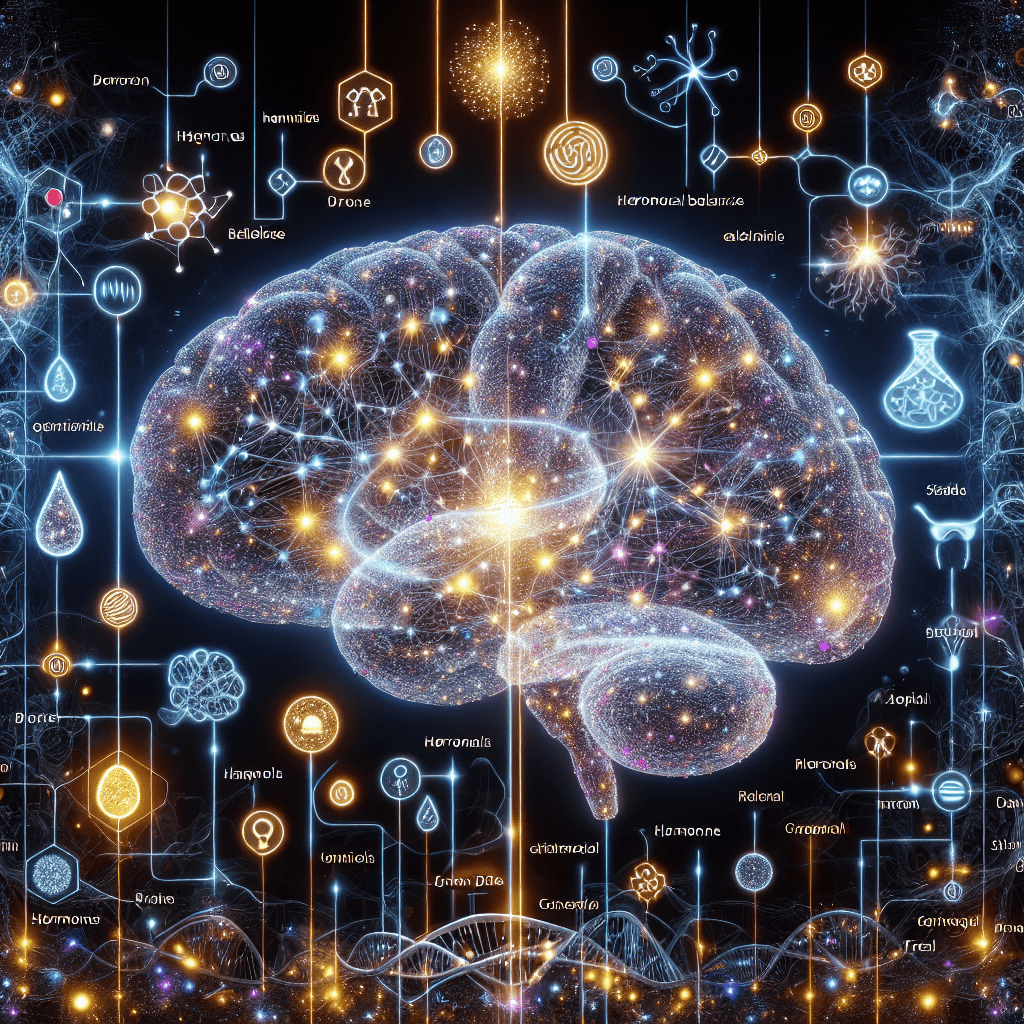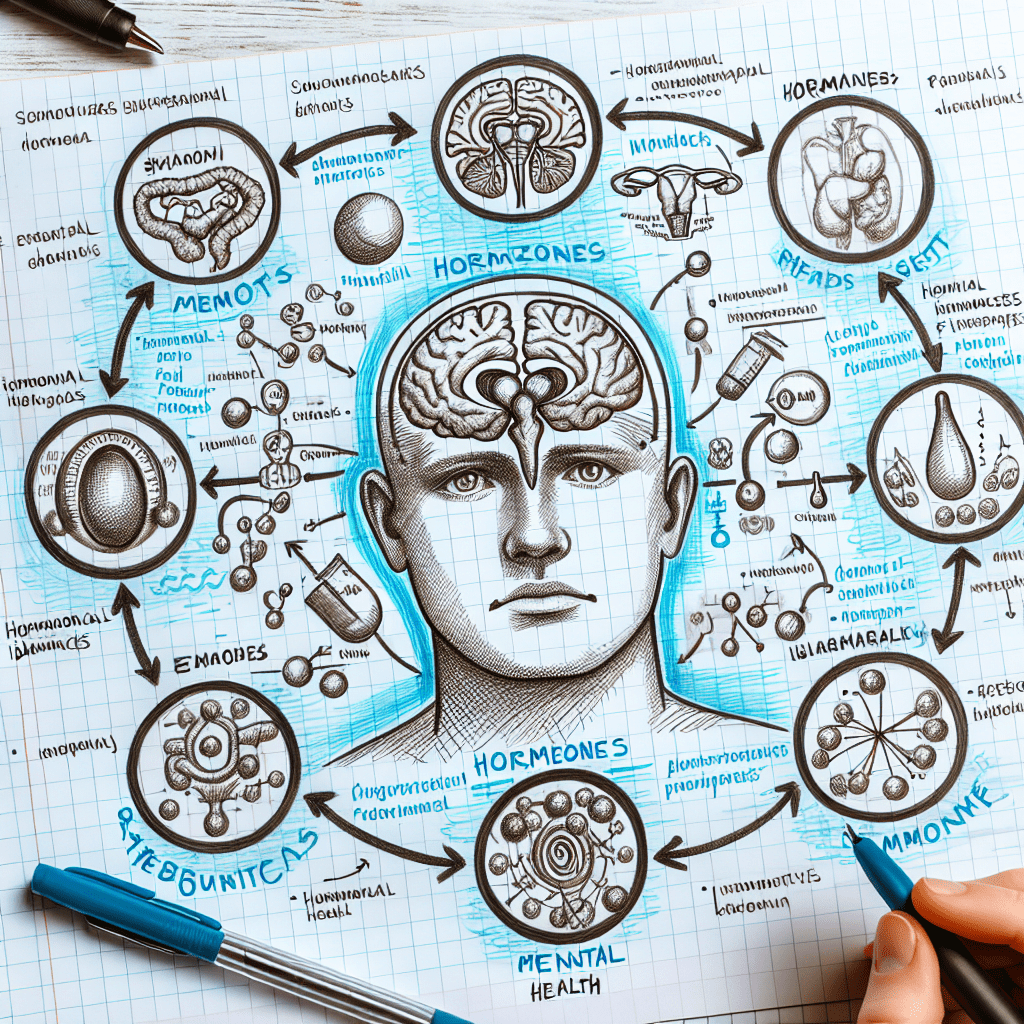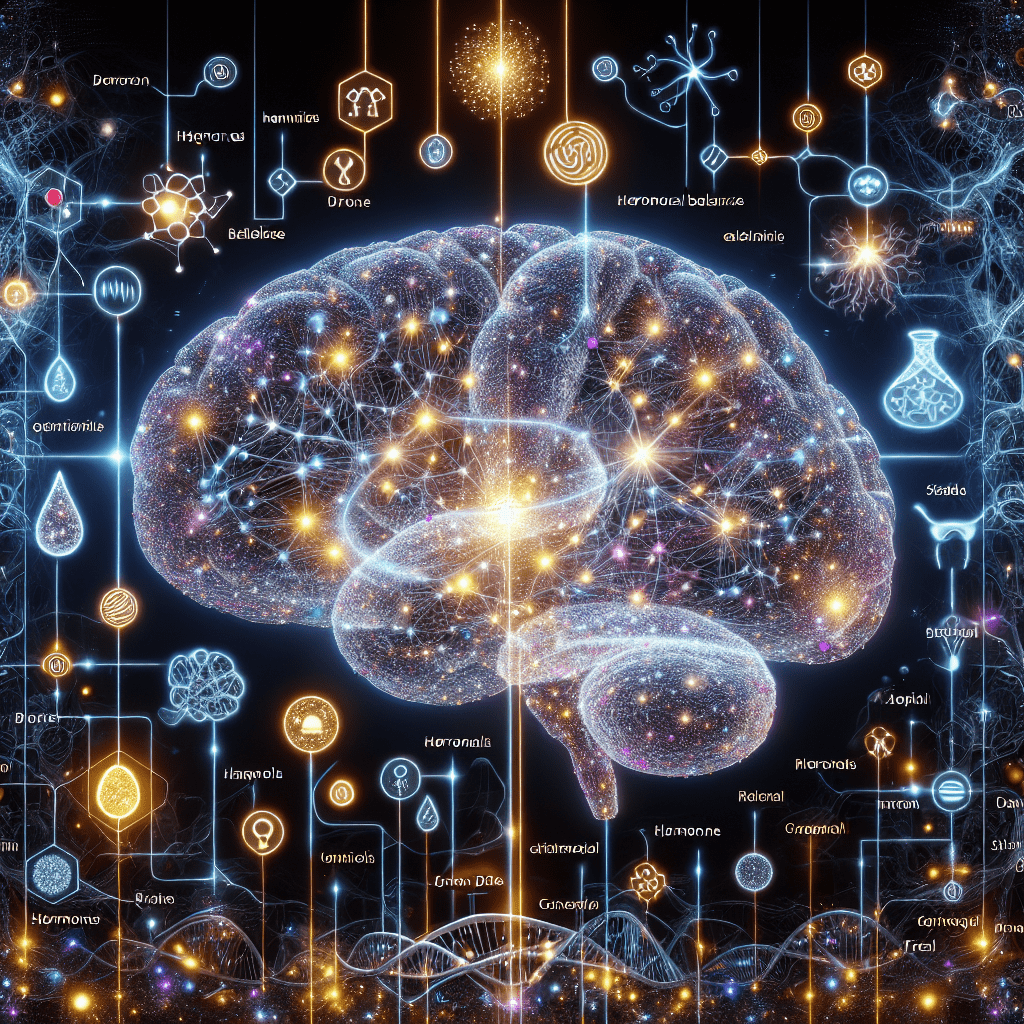Hey there! Ever wondered about the connection between hormones and mental health? Well, buckle up because we are about to dive into this fascinating topic. Hormones, those tiny chemical messengers in your body, play a crucial role in regulating various bodily functions, including brain function. In this article, we’ll explore how hormones can impact your mood, emotions, and overall mental well-being. So get ready to explore the intricate relationship between hormones and mental health, and gain a deeper understanding of how these two are intertwined.

The Role of Hormones in Mental Health
Hormones and their functions
Hormones play a crucial role in our overall mental health and well-being. These chemical messengers are produced by various glands in our body and travel through the bloodstream, affecting different organs and tissues. Each hormone has specific functions and can impact our mood, cognition, and behavior. It’s important to understand how hormones work to grasp their influence on mental health.
The Endocrine System
The endocrine system is responsible for producing and regulating hormones. It consists of glands such as the hypothalamus, pituitary gland, thyroid gland, adrenal glands, and reproductive glands. These glands release hormones in response to signals from the brain or in reaction to certain stimuli. The endocrine system and the hormones it produces work in tandem to maintain balance within the body and contribute to our mental well-being.
The Brain-Hormone Connection
The brain and hormones have a complex relationship. The brain controls the release of hormones through various mechanisms, including the hypothalamus-pituitary axis. The hypothalamus, located in the brain, sends signals to the pituitary gland to release specific hormones that then act on target organs. Hormones, in turn, can influence brain function and vice versa. This bidirectional communication between the brain and hormones plays a critical role in shaping our mental health.
Hormonal Changes and Mental Health Disorders
Hormonal imbalances and mood disorders
Hormonal imbalances can have a significant impact on mental health, often manifesting as mood disorders. For example, an imbalance in serotonin, a neurotransmitter derived from the hormone tryptophan, is associated with depression. Similarly, disruptions in the delicate balance of other hormones like dopamine and norepinephrine can contribute to mood disorders such as anxiety and bipolar disorder. Identifying and addressing hormonal imbalances is crucial in managing mental health disorders.
Hormonal changes during puberty and adolescence
Puberty and adolescence are characterized by significant hormonal changes. The surge in hormones during this period can affect brain development and contribute to the onset of mental health disorders. For example, the hormonal changes experienced during puberty can make individuals more susceptible to mood swings, impulsivity, and increased risk-taking behavior. Understanding the hormonal changes during this critical period is vital for early intervention and support.
Hormones and postpartum depression
The period after childbirth, known as the postpartum period, is a time of hormonal fluctuation for women. These hormonal changes can influence mental health and contribute to the development of postpartum depression. The sudden drop in estrogen and progesterone levels following delivery can lead to mood swings, feelings of sadness and worthlessness, and difficulty bonding with the baby. Recognizing the role of hormones in postpartum depression is essential in providing appropriate care and support to new mothers.
Effects of Stress Hormones on Mental Health
Cortisol and its impact on mood and cognition
Cortisol, often referred to as the “stress hormone,” plays a critical role in our body’s response to stress. While cortisol is essential for survival, chronic exposure to high levels of cortisol can have detrimental effects on mental health. Prolonged stress and elevated cortisol levels have been associated with mood disorders such as depression and anxiety. Furthermore, excessive cortisol can impair cognitive function, leading to difficulties in concentration, memory, and decision-making.
The link between chronic stress and anxiety
Chronic stress triggers a cascade of hormonal responses in the body, including the release of stress hormones like cortisol and adrenaline. Over time, prolonged stress can disrupt the balance of these hormones, contributing to the development of anxiety disorders. The persistent activation of the body’s stress response system can lead to heightened anxiety, panic attacks, and impaired daily functioning. Recognizing the impact of chronic stress on hormonal balance is crucial in managing and treating anxiety.
Hormonal response to trauma and PTSD
Experiencing a traumatic event can trigger significant hormonal changes in the body. In cases of post-traumatic stress disorder (PTSD), the body’s stress response system remains on high alert long after the traumatic event has ended. This prolonged stress response can lead to hormonal imbalances, including elevated levels of cortisol. Hormonal dysregulation in individuals with PTSD can contribute to symptoms such as hyperarousal, intrusive thoughts, and flashbacks. Understanding the role of hormones in trauma-related disorders is important for effective treatment strategies.

Hormonal Influences on Anxiety and Depression
Estrogen and progesterone in women
Estrogen and progesterone, primarily known as female sex hormones, play a crucial role in women’s mental health. These hormones fluctuate throughout the menstrual cycle, influencing mood and emotional well-being. It is during times of hormonal imbalance, such as in premenstrual syndrome (PMS) or perimenopause, that women may experience heightened anxiety or mood swings. Understanding the interplay between estrogen, progesterone, and mental health is essential in providing appropriate support to women.
Hormonal changes during menopause
Menopause marks a significant hormonal transition for women, characterized by the loss of ovarian function and a decline in estrogen and progesterone levels. These hormonal fluctuations can impact mental health and contribute to symptoms such as depression, anxiety, irritability, and poor concentration. The hormonal changes during menopause highlight the need for comprehensive care and support to manage the emotional and psychological aspects of this life stage.
Testosterone and its effects on mental health
While testosterone is typically associated with male reproductive function, it also plays a role in mental health. In both males and females, testosterone levels influence mood regulation, energy levels, and overall well-being. Low levels of testosterone in men have been linked to symptoms of depression, decreased motivation, and cognitive decline. Understanding the influence of testosterone on mental health can aid in developing targeted interventions and treatments.
Thyroid Hormones and Mental Health
Hypothyroidism and depression
Hypothyroidism occurs when the thyroid gland fails to produce enough thyroid hormones. Insufficient levels of thyroid hormones can lead to various physical and mental health symptoms, including depression. Thyroid hormones play a crucial role in regulating metabolism and neurotransmitter function. When thyroid hormone levels are imbalanced, individuals may experience persistent sadness, low energy, and difficulties in cognition. Recognizing the connection between thyroid hormones and mental health is essential for accurate diagnosis and effective treatment.
Hyperthyroidism and anxiety
Hyperthyroidism, on the other hand, involves excessive production of thyroid hormones. The overactive thyroid gland can accelerate metabolism and lead to heightened physiological arousal. This excessive stimulation can result in symptoms of anxiety, including restlessness, irritability, and racing thoughts. Treating the underlying hormonal imbalance is crucial in managing the mental health symptoms associated with hyperthyroidism.
Thyroid hormones and cognitive function
Thyroid hormones also play a critical role in cognitive function. Both hypo- and hyperthyroidism can impact memory, attention, and other cognitive processes. Hypothyroidism can lead to difficulties in concentration and memory recall, while hyperthyroidism can cause restlessness and poor attention span. Understanding the connection between thyroid hormones and cognitive function is vital in addressing cognitive impairments associated with thyroid disorders.
The Impact of Sex Hormones on Mental Health
Role of sex hormones in brain development
Sex hormones, such as estrogen, progesterone, and testosterone, play a vital role in brain development. During critical periods of brain development, these hormones shape the structure and function of the brain, influencing behavior, mood, and cognition. Differences in sex hormone levels between males and females contribute to variations in mental health outcomes and vulnerability to certain disorders. Recognizing the impact of sex hormones on brain development is crucial for understanding mental health differences between genders.
Hormones and gender identity
Gender identity, the internal sense of being male, female, or non-binary, is also influenced by hormones. The interplay between sex hormones and brain development during early stages of life contributes to the establishment of gender identity. While the precise mechanisms are still being explored, hormonal imbalances or variations can potentially influence gender identity and contribute to mental health challenges. Understanding the complex relationship between hormones and gender identity is essential for supporting individuals’ mental well-being.
Hormonal influences on mood and behavior
Sex hormones have a profound impact on mood and behavior. Changes in hormone levels throughout the menstrual cycle, as well as during pregnancy and menopause, can influence emotional well-being. For example, fluctuations in estrogen and progesterone levels can contribute to mood swings, irritability, and even depressive symptoms. Similarly, imbalances in testosterone levels can affect mood regulation and lead to changes in behavior. Recognizing the hormonal influences on mood and behavior is crucial in providing targeted support and interventions.
Hormonal Regulation of Sleep and Mental Health
Melatonin and its role in sleep-wake cycles
Melatonin is a hormone that regulates our sleep-wake cycles, also known as the circadian rhythm. It is produced by the pineal gland in response to darkness, helping to promote sleep. Disruptions in melatonin levels can contribute to sleep disturbances, such as insomnia. Adequate melatonin production and regulation are essential for maintaining healthy sleep patterns and overall mental well-being.
Insomnia and hormonal imbalances
Insomnia, characterized by difficulty falling asleep or staying asleep, can be influenced by hormonal imbalances. Hormonal changes, such as those experienced during menopause or pregnancy, can disrupt sleep patterns and contribute to insomnia. Similarly, conditions like sleep apnea and restless leg syndrome, which can be affected by hormonal factors, can also lead to sleep disturbances. Understanding the hormonal influences on sleep is crucial in addressing insomnia and promoting better mental health.
Sleep disturbances and mental health disorders
Sleep disturbances can have a significant impact on mental health. Chronic sleep deprivation or poor sleep quality can contribute to the development or exacerbation of mental health disorders such as depression and anxiety. Disruptions in hormone regulation, especially those involved in sleep-wake cycles, play a role in the relationship between sleep and mental health. Recognizing and addressing sleep disturbances is essential in comprehensive mental health care.
Hormones and Eating Disorders
Leptin and ghrelin: Hormonal regulation of appetite
Leptin and ghrelin are two hormones involved in the regulation of appetite and hunger. Leptin, produced in fat cells, helps to suppress appetite and regulate energy balance. Ghrelin, on the other hand, stimulates appetite and is released from the stomach. Dysregulation of these hormones can contribute to the development of eating disorders, such as anorexia nervosa and bulimia nervosa. Understanding the hormonal influences on appetite can aid in the diagnosis and treatment of eating disorders.
Hormonal changes in anorexia nervosa
Anorexia nervosa, characterized by a distorted body image and severe restriction of food intake, often involves hormonal imbalances. The hormonal changes associated with anorexia nervosa can have significant impacts on mental health. Low levels of hormones like leptin can contribute to mood disturbances and cognitive impairments. Recognizing the hormonal influences in individuals with eating disorders is crucial in providing comprehensive care and support.
Bulimia nervosa and hormonal imbalances
Bulimia nervosa, characterized by periods of binge-eating followed by compensatory behaviors, can also involve hormonal imbalances. Frequent cycles of binging and purging can disrupt hormonal regulation, leading to irregularities in hormone levels and fluctuations in mood and behavior. Understanding the hormonal influences on bulimia nervosa is key to developing effective treatment strategies that address both the physical and mental health aspects of the disorder.
Hormones, Ageing, and Cognitive Decline
Hormonal changes during aging
As we age, hormonal changes occur that can influence mental health and cognitive function. For example, a decline in estrogen levels during menopause can contribute to symptoms of depression and cognitive decline. Similarly, in men, declining testosterone levels can be associated with increased risk of depressive symptoms and cognitive impairment. Addressing the hormonal changes associated with aging is crucial in supporting mental well-being in older adults.
Effects of hormone replacement therapy on cognition
Hormone replacement therapy (HRT) involves supplementing declining hormone levels with artificial hormones. HRT, particularly estrogen therapy in women, has been shown to have both positive and negative effects on cognition. While estrogen therapy may improve certain cognitive functions, it is not without risks. Careful consideration and individualized treatment plans are necessary when considering HRT for mental health benefits.
Hormones and neurodegenerative diseases
Hormonal imbalances and changes in hormone levels can also influence the onset and progression of neurodegenerative diseases such as Alzheimer’s disease. Studies have suggested a link between estrogen levels and cognitive decline, with lower estrogen levels associated with increased risk of Alzheimer’s disease. Understanding the role of hormones in neurodegenerative diseases can provide insights into potential therapeutic approaches and preventive measures.
The Role of Hormones in Psychiatric Medications
Antidepressants and serotonin levels
Many commonly prescribed antidepressant medications work by targeting the neurotransmitter serotonin in the brain. Serotonin plays a crucial role in regulating mood, and imbalances in serotonin levels are associated with depression. Antidepressants can help restore balance by increasing serotonin availability in the brain. Understanding the relationship between antidepressants and serotonin can aid in the development of effective treatment plans for depression.
Antipsychotic medications and dopamine
Antipsychotic medications are often used in the treatment of psychiatric disorders such as schizophrenia. These medications work by blocking dopamine receptors in the brain, reducing the activity of this neurotransmitter. Dopamine imbalances have been linked to symptoms of psychosis, and antipsychotic medications help to restore the balance. Recognizing the role of dopamine in mental health and the effects of antipsychotic medications is crucial in managing psychotic disorders.
Hormones as potential targets for treatment
Given the significant influence hormones have on mental health, they have emerged as potential targets for treatment in psychiatric disorders. Researchers have been exploring the use of hormone-based treatments, such as hormone replacement therapy or hormone-modulating medications, in managing mental health conditions. By targeting hormone imbalances, it may be possible to develop more personalized and effective treatment approaches. Further research in this area holds promise for the future of mental health care.
In conclusion, hormones play a fundamental role in our mental health. Their impact extends beyond sexual and reproductive functions, influencing mood, cognition, and behavior. Understanding the intricate interplay between hormones and mental health is essential for accurately diagnosing and effectively managing mental health disorders. By recognizing and addressing hormonal imbalances, we can strive to optimize mental well-being and improve the lives of individuals affected by mental health challenges.

